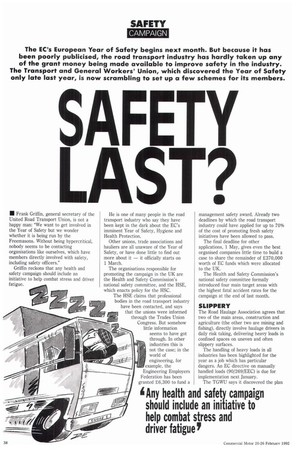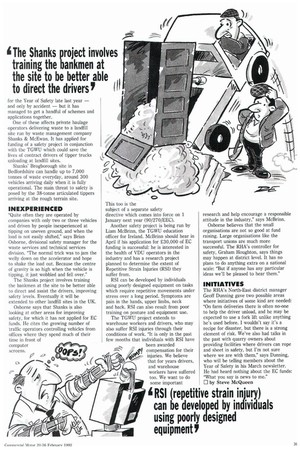SA F E TY LA S T?
Page 40

Page 41

If you've noticed an error in this article please click here to report it so we can fix it.
• Frank Griffin, general secretary of the United Road Transport Union, is not a happy man: We want to get involved in the Year of Safety but we wonder whether it is being run by the Freemasons. Without being hypercritical, nobody seems to be contacting organisations like ourselves, which have members directly involved with safety, including safety officers."
Griffin reckons that any health and safety campaign should include an initiative to help combat stress and driver fatigue. He is one of many people in the road transport industry who say they have been kept in the dark about the EC's imminent Year of Safety, Hygiene and Health Protection.
Other unions, trade associations and hauliers are all unaware of the Year of Safety, or have done little to find out more about it — it officially starts on 1 March.
The organisations responsible for promoting the campaign in the UK are the Health and Safety Commission's national safety committee, and the HSE, which enacts policy for the HSC. The HSE claims that professional bodies in the road transport industry have been contacted, and says that the unions were informed through the Trades Union Congress. But somehow little information seems to have got through. In other industries this is not the case; in the world of engineering, for example, the Engineering Employers Federation has been granted £6,300 to fund a management safety award. Already two deadlines by which the road transport industry could have applied for up to 70% of the cost of promoting fresh safety initiatives have been allowed to pass.
The final deadline for other applications, 1 May, gives even the best organised companies little time to build a case to share the remainder of £370,000 worth of EC funds which were allocated to the UK.
The Health and Safety Commission's national safety committee formally introduced four main target areas with the highest fatal accident rates for the campaign at the end of last month.
SLIPPERY
The Road Haulage Association agrees that two of the main areas, construction and agriculture (the other two are mining and fishing), directly involve haulage drivers in daily risk taking, delivering heavy loads in confined spaces on uneven and often slippery surfaces.
The handling of heavy loads in all industries has been highlighted for the year as a job which has particular dangers. An EC directive on manually handled loads (90/269/EEC) is due for implementation next January.
The TGWU says it discovered the plan for the Year of Safety late last year — and only by accident — but it has managed to get a handful of schemes and applications together.
One of these affects private haulage operators delivering waste to a landfill site run by waste management company Shanks & McEwan. It has applied for funding of a safety project in conjunction with the TGWU which could save the lives of contract drivers of tipper trucks unloading at landfill sites.
Shanks' Brogborough site in Bedfordshire can handle up to 7,000 tonnes of waste everyday, around 300 vehicles arriving daily when it is fully operational. The main threat to safety is posed by the 38-tonne articulated tippers arriving at the rough terrain site.
INEXPERIENCED
"Quite often they are operated by companies with only two or three vehicles and driven by people inexperienced at tipping on uneven ground, and when the load is not easily shifted," says Brian Osborne, divisional safety manager for the waste services and technical services division. "The normal trick was to jam the welly down on the accelerator and hope to shake the load out. Because the centre of gravity is so high when the vehicle is tipping, it just wobbled and fell over."
The Shanks project involves training the bankmen at the site to be better able to direct and assist the drivers, improving safety levels. Eventually it will be extended to other landfill sites in the UK.
Osborne says that Shanks is also looking at other areas for improving safety, for which it has not applied for EC funds. He cites the growing number of traffic operators controlling vehicles from offices where they spend much of their time in front of computer screens. This too is the subject of a separate safety directive which comes into force on 1 January next year (90/270/EEC).
Another safety project is being run by Liam McBrinn, the TGWU education officer for Ireland. McBrinn should hear in April if his application for £30,000 of EC funding is successful: he is interested in the health of VDU operators in the industry and has a research project planned to determine the extent of Repetitive Strain Injuries (RSI) they suffer from.
RSI can be developed by individuals using poorly designed equipment on tasks which require repetitive movements under stress over a long period. Symptoms are pain in the hands, upper limbs, neck and back. RSI can also result from poor training on posture and equipment use.
The TGWU project extends to warehouse workers and drivers, who may also suffer RSI injuries through their conditions of work. 'It is only in the past few months that individuals with RSI have been awarded compensation for their injuries. We believe that for years drivers, and warehouse workers have suffered too. We want to do some important research and help encourage a responsible attitude in the industry," says McBrinn.
Osborne believes that the small organisations are not so good at fund raising. Large organisations like the transport unions are much more successful. The RHA's controller for safety, Graham Houghton, says things may happen at district level. It has no plans to do anything extra on a national scale: "But if anyone has any particular ideas we'll be pleased to hear them."
INITIATIVES
The RHA's North-East district manager Geoff Dunning gave two possible areas where initiatives of some kind are needed: "On farm deliveries there is often no-one to help the driver unload, and he may be expected to use a fork lift unlike anything he's used before. I wouldn't say it's a recipe for disaster, but there is a strong element of risk. We've also had talks in the past with quarry owners about providing facilities where drivers can rope and sheet in safety, but I'm not sure where we are with them," says Dunning, who will be telling members about the Year of Safety in his March newsletter. He had heard nothing about the EC funds: "What you say is news to me."
by Steve McQueen




















































































